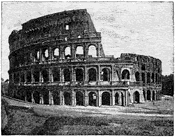

PISH-POSH FROM MY VIRTUAL SPACEby David EideThe Values That Emerge
|

Idle Musings of the Hypothetical Citizen
He raised a devilish sort of question one afternoon, after listening to a pontificator who had never fought for his freedom, did not know what poverty was, had never nourished the idea of killing someone, and believed the statements contained in the worst books possible.
"If the people are rotten why would the politics be any better?" He thought to himself. "The politics would only be better if the political class saw itself as above and beyond the reach of the people. And at that point we would call it by another name, wouldn't we?"
It was always present in his own region. He heard the politicians talk but realized what they were really saying was, "my people are idiots and they don't know shit from shinola but we must be delicate about this..." At the moment the politician became a characture of some failed novelist's notebook it was a sign of a kind of demise.
"They cultivate and use to their advantage;" this was said of all but it was especially true of the politicians who had become humorous types trying to gain authority in an environment that despised authority. They could affect a sort of pleasing-to-people voice and face but the reality was the role of politician made a man or woman something other than a mere representative or that august title, "law-giver."
The truth was law was made and broken by people, powerful and no, all the time. The people viewed law as their enemy and fought against it in very curious ways. Law was a kind of unattainable power, a minor god, that stood watch over the nasty dealings of human beings. But it too was a kind of Loki, ready to break itself when it had the chance.
After awhile the people let go of the politicians and the politicians let go of the people. So, there was a fastidious line drawn but before any trouble arose both sides would die of old age and fade into the past.
"Fade into the past."
There was nothing more frightening to a powerful figure than that they would "fade into the past." The powerful always thought to themselves, "No, the common people fade into the past. All their godawful habits, their "culture," their weirdness all slips down into the toilet of history. But I.....I will last!" And so the political class competed with itself, not over ideology, but over who would last and make a mark on history. The ideology only served to give definition to what history might be.
"History is written by politically-sodden amateurs who enter the university fraudulently." One side of the political conflict was confident of this. "No, history is written by the finest minds, completely aloof from the time they are thrown into and casting a mindful eye over the whole scope of history, or a history. Therefore, they seek truth and he or she who stands the scrutiny demands to live in the historical imagination."
He knew the truth was that both would fade into the past and be excellent lessons for those who came after. The truth of the matter was that it only took a critical mass of people running down together, to create a huge feast of decline, while the minority would cling onto anything they could. For one it was an idea, for another it was a family, for a third it was a new technical gadget that clicked clicked clicked in his ear like the fantastic tapping of new shoes on boards, for a fourth it was money and property, for a fifth it was the stubborn belief through his life that what appeared to be never was. In fact, he came to bet on the very opposite of what he believed was really happening. If he felt this steady decline in culture it was simply the effect of a bad family. That was it, he reasoned to himself. "I come from a bad family, one that wants to punish its members for trying to be free, they collapsed on me and I fought them one by one but in the process lost my energy. And now I merely project it against this mass of stuff in front of me known as society."
The politicians always believed it was the magic of their speeches that would keep things on the upward path. In fact, it was apparent that almost all political speeches were the same from the beginning of time because the politician had been taught early on that words were godlike and could create reality.
"How did it get to this point? How did I get to this point?" He kept asking himself over and over as he rode the silver train through the familiar urban landscapes. Ah, the old rusted out auto parts yard. And those rows and rows of houses that fellow human beings lived in.
He closed his eyes.
Behind him was a conversation between two women or girls, peppered with squirming laughter and cuss words.
It was quiet now or he blocked it all out. What was the way that led to this stinking place in my mind? What?
In the deepest part of youth there was some general conception of a body politics or a society; a coherent and integrated view. Ah, the public school system and television which had brought the big events to small minds gathering frequently before the flickering light. The teachers passed fundamental information about the structure of government. He understood very little of it because he couldn't correlate the information with anything real to his youthful mind. Once in awhile he heard his parents talking, agreeing or disagreeing about issues that were around and about. In fact, he had this awareness that the "system" was pretty accessible and one could dream of being a president and when he listened closely to politicians, local or national, there was a distinct limitation to what they said and it make it appear that he, too, could be a politician. Through college he was met by big, on-going issues.
The whole idea of a "system" was brought into focus. The most difficult transition was understanding that his nation of birth was not a democracy but a republic. It was democracy, the Ideal that he thirsted for. He had fascination for communes and had solidarity for vast festivals of the "people" like Woodstock. And as he became more enamored of democracy he became more alienated from the republic.
The republic seemed to be produced out of an oppressive Empire rather than out of the desire to be free. It was the great divide in youth. The republic was easily seen as a structure of self-interest, a corrupt structure conditioned and fated by time. It was Authority and little else. It took the money from the people and distributed it among the bureaucracy behind the Beltway. It made laws no one could fully understand. It did things that no one could make sense of. It appeared to be a master rather than the servant it was set up to be.
Watergate braced that view of things. After Watergate the Republic was very shaky. And yet, even the attraction to democracy began to fade as experience cut out a few of his ideals. So there was a parenthesis as the transition between the democracy and the republic occurred. He turned away from politics and wanted more profound expressions of life.
When he was most alienated from the republic he saw the limitations of power. He saw the quality of democracy was something to be taken up by the individual citizen even if he lived in a republic. He studied the republic even though it was larger than he could wrap his arms around.
The vague political associations came and went: Progressive, utopian, Democrats, Libertarian, then a kind of independence.
He came to the realization that the republic was not the end-all, be-all of human endeavor. It would be a long, long time before it was replaced by something else. He told himself that he ever found something better he would promote it, if he saw the future he would report it, but until that time he would study the republic and play the role of citizen in it.
As he studied it he saw the lines of fracture at every turn. He saw the multitude of conflicts. And a point was reached where he had to decide whether he was going to describe the republic or join an interest and fight for one fragment against the other fragments. He was certain that there were a great number of people , very intelligent, who took an interest in what was going on and wouldn't allow it to tumble away as all other power structures had in history.
It was in a certain relaxed state of being he asked a simple question: How was the republic going to be improved:
- If it was too vast and complex to be fully comprehended by the citizen or even a committee of academics?
- If the bureaucracy was only interested in getting the job done rather than "improving itself?"
- If the citizens could afford not to pay it heed since there were so many tempting pleasures that the culture had developed?
- If it constantly contradicted its principles in dealing with the rest of the world; that its actions and its words split, so confusing and alienating the citizens?
© 2006 David Eide. All rights reserved.
David Eide
Back to Oasis